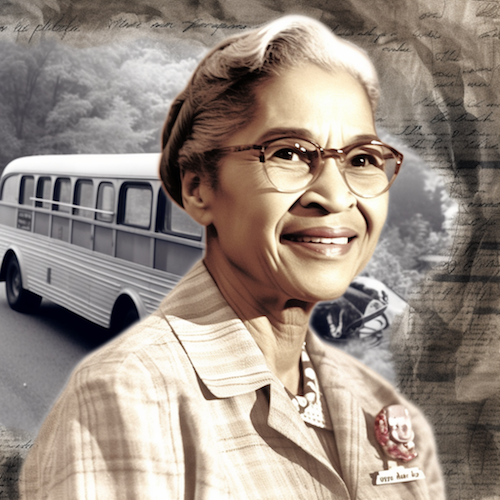¶ Rosa Parks

¶ Introduction
Rosa Louise McCauley Parks (February 4, 1913 – October 24, 2005) was an American civil rights activist known for her pivotal role in the African American civil rights movement. Her steadfast refusal to surrender her bus seat to a white passenger in Montgomery, Alabama, on December 1, 1955, sparked the Montgomery Bus Boycott and marked a significant turning point in the fight against racial segregation.
¶ Early Life and Education
Born in Tuskegee, Alabama, Rosa Parks grew up in a racially segregated and deeply discriminatory environment. She attended the Montgomery Industrial School for Girls, where she developed a passion for civil rights and social justice. Parks' upbringing and education fueled her commitment to combating racial inequality.
¶ The Montgomery Bus Boycott
Rosa Parks' defiance on that fateful December day ignited a 381-day boycott of the Montgomery bus system, organized by the Montgomery Improvement Association and led by a young minister named Martin Luther King Jr. The boycott aimed to challenge the city's segregation laws and bring attention to the injustices faced by African Americans. Parks' act of civil disobedience and her subsequent arrest catapulted her into the spotlight as a symbol of resistance against racial oppression.
¶ Legacy and Contributions
Parks' actions and the success of the Montgomery Bus Boycott were instrumental in sparking a nationwide movement against segregation and discrimination. Her courageous stand laid the foundation for other nonviolent protests and civil rights initiatives that followed, including the Civil Rights Act of 1964 and the Voting Rights Act of 1965.
Throughout her life, Rosa Parks remained dedicated to civil rights causes, working with various organizations, including the NAACP (National Association for the Advancement of Colored People). She continued to be a voice for justice, equality, and the empowerment of marginalized communities.
¶ Honors and Recognition
Rosa Parks' contributions to the civil rights movement earned her numerous accolades and honors. In 1996, she was awarded the Presidential Medal of Freedom, the highest civilian honor in the United States. She also received the Congressional Gold Medal, making her the first woman and the second African American to be given this distinction. Parks' legacy has been celebrated through the establishment of Rosa Parks Day in several states, and her story continues to inspire activists worldwide.
¶ Later Life and Passing
After the Montgomery Bus Boycott, Rosa Parks and her husband, Raymond Parks, faced considerable challenges, including harassment and job loss due to their civil rights activism. They eventually moved to Detroit, Michigan, where Rosa Parks worked for Congressman John Conyers, focusing on constituent services and civil rights advocacy.
Rosa Parks passed away on October 24, 2005, at the age of 92. Her unwavering commitment to justice and equality has left an indelible mark on American history and serves as a reminder that one person's courageous actions can have a profound impact on the world. Her name and legacy continue to stand as symbols of resilience and determination in the face of adversity.
¶ FAQs
¶ Why did Rosa Parks refuse to give up her seat on the bus?
Rosa Parks refused to give up her seat on the bus because she was tired of being treated as second-class citizen. She had been discriminated against her whole life, and she was finally fed up. She knew that her act of defiance would not change things overnight, but she hoped that it would inspire others to stand up for their rights.
¶ Was Rosa Parks the first person to refuse to give up her seat on a bus?
No, Rosa Parks was not the first person to refuse to give up her seat on a bus. There were several other African American women who had been arrested for doing the same thing before her. However, Parks's case was the one that caught the attention of the nation and sparked the Montgomery Bus Boycott.
¶ What was the impact of Rosa Parks's actions?
Rosa Parks's actions had a profound impact on the civil rights movement. Her refusal to give up her seat on the bus sparked the Montgomery Bus Boycott, which lasted for over a year and involved over 50,000 African Americans. The boycott eventually led to the desegregation of buses in Montgomery, Alabama, and it served as a model for other civil rights protests around the country.
¶ What were Rosa Parks's biggest challenges?
Rosa Parks faced many challenges throughout her life, including racism, sexism, and poverty. She was also arrested several times for her activism. However, she never gave up fighting for what she believed in. She was a strong and determined woman who dedicated her life to fighting for equality for all people.
¶ What did Rosa Parks do after the Montgomery Bus Boycott?
After the Montgomery Bus Boycott, Rosa Parks continued to be active in the civil rights movement. She worked with the NAACP and other organizations to promote equality for African Americans. She also wrote a book about her life, titled "My Story." Rosa Parks died in 2005 at the age of 92. She is remembered as a hero of the civil rights movement and a role model for all people who fight for justice.